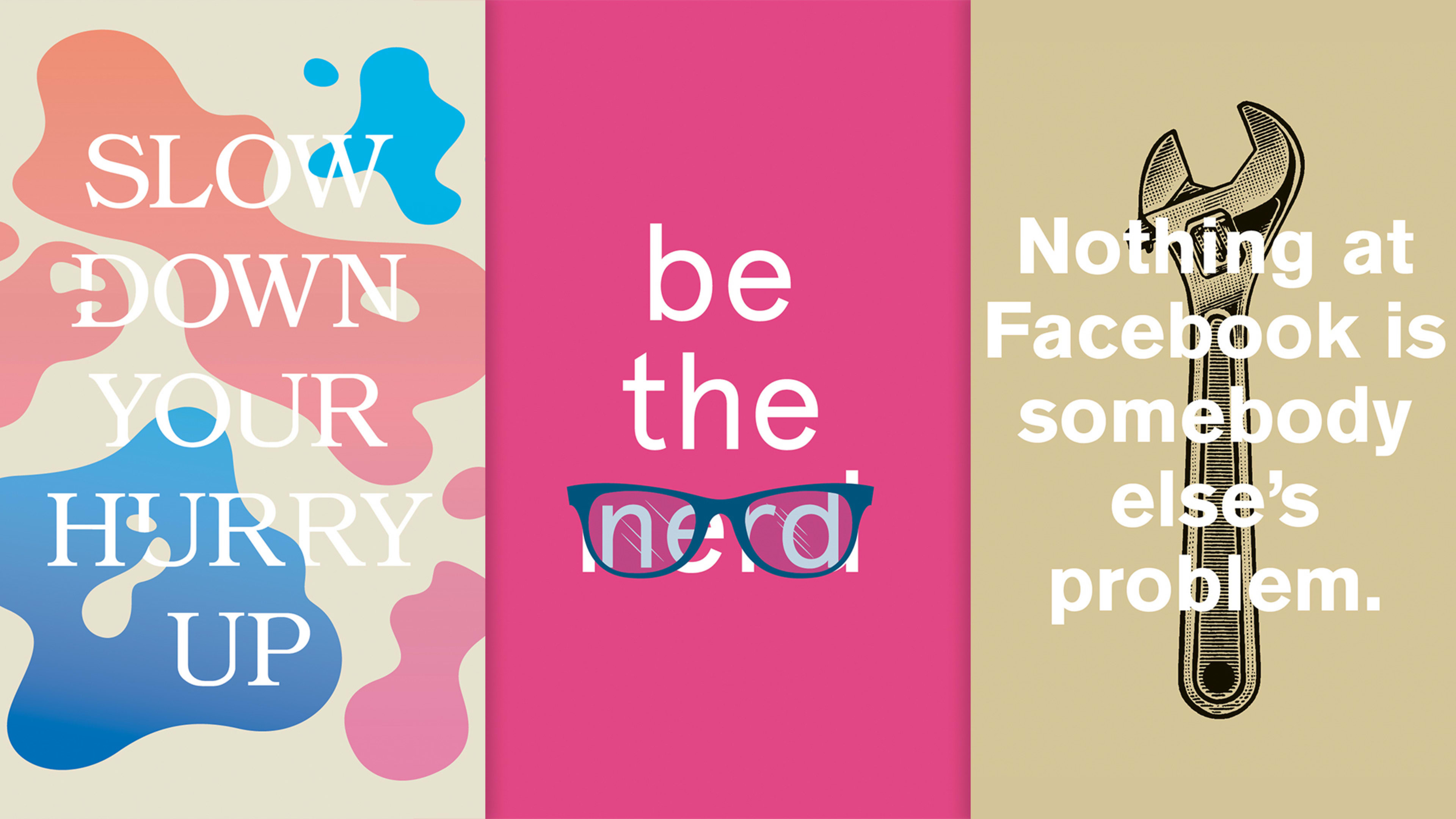In 2010, when Facebook was riding high with more than 500 million users, two Facebook employees took over an unused warehouse space in one of the company’s new buildings. Guerrilla-style, they began making posters with slogans like “Stay Focused and Keep Shipping” and “What would you do if you weren’t afraid?” They codified company culture–then best described by the now-famous slogan “Move Fast and Break Things”–in ink.
Now, Facebook is no longer the darling of the tech world. Its misuse of user data in the Cambridge Analytica scandal landed CEO Mark Zuckerberg in front of Congress. The UN has blamed the company’s platform for helping incite a genocide in Myanmar. Facebook allowed Russian-backed fake news and propaganda to run rampant on its site, possibly influencing the 2016 election.
But its group of poster-makers, institutionalized as the Analog Research Lab (ARL), is still going strong, with 10 labs around the globe and more than 20 full-time employees. An exhibition currently on view at the Type Directors Club in New York glorifies the posters for “opening doors to new ways of looking at the world, finding community, inviting dialog, and creating positive friction that meaningfully affects people.” But there’s another way to read them: as the artifacts of a company in the throes of a identity crisis. If you want to stare at Facebook’s soul in 2019, start with the Analog Research Lab.
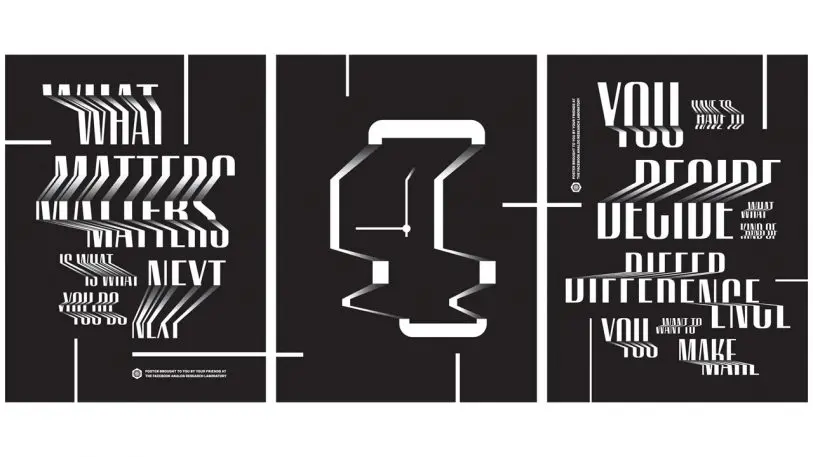
“What matters is what you do next”
Case in point: the posters you see above. Produced by the ARL in 2018 and designed by ARL head Scott Boms, the black posters feature distorted lettering. One looks like a clock that’s been bent out of shape; the other two are barely legible but read “What matters is what you do next,” and “You have to decide what kind of difference you want to make.” It’s a far cry from the heads-down “keep shipping” messaging of the ARL’s earliest days.
“I think there’s a kind of responsibility that people just inherently feel here, and the point with the black-and-white What Matters series of work is to acknowledge that humans are fallible, we make mistakes,” Boms says. “There’s a push-and-pull to doing the right thing, and doing the right thing when you have a lot of different things pulling at you is a really difficult task.”
It’s a familiar refrain to anyone who has listened to Facebook’s rhetoric over the past couple of years. Facebook is trying to do the right thing. Combatting misinformation is a Herculean problem. The company is doing the best it can.
But it’s one thing for Mark Zuckerberg to express such sentiments to the public, to whom he is accountable if he wants to maintain the health of his business. It’s another for that messaging to literally line the walls of Facebook itself. What’s the point? And what does it say about Facebook that the messaging these days has more to do with assuaging employees’ guilt than facing anything head on?
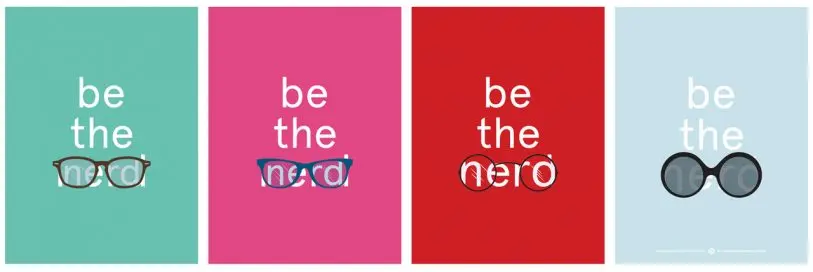
Motivation, the ultimate management technique
The short answer is motivation. Study after study shows that employees want meaningful work. And art is a small, but useful, way to sell workers on corporate values.
Facebook, of course, isn’t the only corporation to use art and design to try to motivate employees. IBM, famously, had designers create posters in the 1970s, broadcasting the company as forward-thinking and inclusive. Like Facebook’s posters, many of IBM’s visuals featured mantras that were meant to persuade employees that their work was meaningful. Many other companies use motivational posters to the same end.
Camilo Arévalo, who worked at Facebook from 2015 to 2016 as a product manager, says when he was first started working at the company, he loved the posters. “During my time at Facebook I felt almost proud about the kind of stuff that the ARL was churning out,” he says. “I thought it was really impactful in a very artistic way.”
Arévalo initially was so inspired by the posters and their messages that he would take posters from the ARL and put them up in his apartment. “When you go into the office and see a poster in the stairwell, and a poster on your manager’s desk, and in the bathroom and in the break room, all these posters with all these messages–assuming that you buy into the message they’re telling you–it’s an uplifting feeling,” he says. “It’s like someone’s beating a drum, and you’re marching along to that rhythm.”
It’s a sly bit of management psychology. Phrases like “Be the nerd” and “The quick shall inherit the earth” equate working smart and fast with expressing personal identities. In effect, you are how hard you work–which, of course, is a great way to persuade people to work all the time, as Stanford professor Fred Turner explains in a recently published paper on Facebook’s arts program. The newer slogans might be less voracious, but they’re equally as concerned with making work personal. “What matters is what you do next” could be read as both a professional call to arms and a goal plucked from the pages of a self-help book.
To Turner, such messaging isn’t just a subtly insidious way of controlling workers; it also encourages the blind-eye syndrome that got Facebook into so much trouble in the first place. When you’re laser-focused on maximizing your own potential, you aren’t as aware of the world around you. He writes: “The posters and murals these units produce encourage Facebook’s workers to imagine themselves not as architects of a global surveillance apparatus, but as creative technical artists and perhaps even builders of a new, individual-centered expressive democracy.”
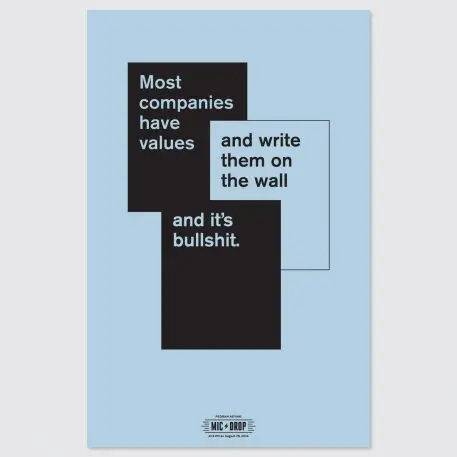
More top-down than it seems
Interestingly, nothing out of the ARL comes from Facebook’s management, at least not on the surface. The ARL is a grassroots project that grew organically out of an employee initiative and to this day, the posters are produced by employees, not by the company’s leadership. But it’s a mistake to think that the entire enterprise is employee-driven.
One current Facebook employee who requested anonymity for fear of retribution describes how during standard weekly employee question-and-answer sessions with Zuckerberg or COO Sheryl Sandberg, the ARL is sometimes on the ground to distribute the leaders’ messages. “I remember during a lot of these Q&As… there’d be representatives from the Analog Lab to go and print posters of these interesting or notable quotes [from Zuckerberg or Sandberg], and distribute them during the Q&A, and put them all around the walls so that when you walked out of the Q&A there’d be all these posters of what Sheryl just talked about,” the person says. “They had people called runners who’d run back and forth from the lab, delivering the fresh posters to all the different buildings.”
Boms confirmed that the ARL did these real-time posters every week for three to four months in 2015 as an experiment. Since then, the lab only does these “Mic Drops,” as they’re called, a few times a year during important employee Q&A sessions, in part because the team wanted more time to illustrate the company’s leaders’ words.
Boms calls the ARL’s task “backward propaganda,” because leadership doesn’t explicitly mandate the messages. But that’s the subtle genius of the ARL–its messages do support Facebook’s management, despite being created by workers.
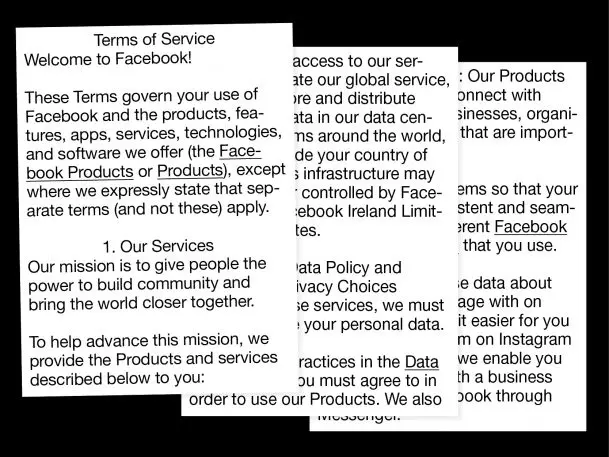
“People don’t really want to stir the pot”
For all his rhetoric about the ARL’s bottom-up structure, Boms recognizes that in insular Silicon Valley, it can be hard to think critically about Facebook’s place in the world. As a result, he started a new Designer-in-Residence program in 2016 to bring in more outside views. “We’re not telling [the designers] what to make,” he says. “It’s them bringing their voices and ideas and their perspectives of everything that’s happening and putting it in front of [employees] so they’re not just staring at the Silicon Valley world.”
One of these designers who recently wrapped up a six-week residency in Facebook’s New York office, Luiza Dale, made an installation that’s perhaps the most controversial work the ARL has ever produced (though according to Boms, no one was actually upset by it). She printed out Facebook’s terms and conditions on a giant stack of posters and put them in the New York office for employees to take. The goal was to spark conversation about the legal document that dictates users’ relationship with Facebook–one that few people ever take the time to read or engage with, a fact that benefits Facebook (and other corporations) mightily.
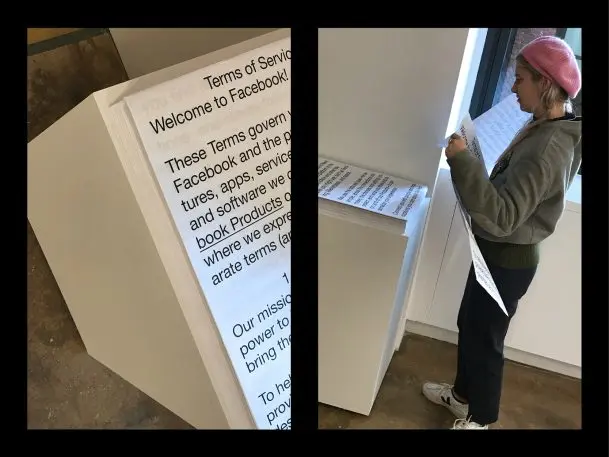
Dale’s project hints at another, more radical path for the ARL: that of company provocateur. Facebook has developed a reputation for a cult-like culture that prioritizes loyalty over dissidence; as CNBC reported this year, the company has an employee review system that rewards people who follow the company’s leaders and their orders without voicing any concerns. The ARL, as it stands, reflects this toe-the-line mentality. “With a lot of the other posters in the program, there’s a lot of quotes, it’s all very positive and inspirational,” Dale says. “People don’t really want to stir the pot. They’re very cautious.” But it doesn’t have to be that way. Facebook might do well to heed its own advice: What matters is what you do next.
Recognize your brand’s excellence by applying to this year’s Brands That Matter Awards before the early-rate deadline, May 3.
